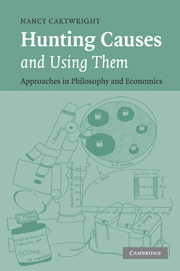Book contents
- Frontmatter
- Contents
- Acknowledgements
- Introduction
- Part I Plurality in causality
- Part II Case studies: Bayes nets and invariance theories
- Part III Causal theories in economics
- 11 Preamble
- 12 Probabilities and experiments
- 13 How to get causes from probabilities: Cartwright on Simon on causation
- 14 The merger of cause and strategy: Hoover on Simon on causation
- 15 The vanity of rigour in economics: theoretical models and Galilean experiments
- 16 Counterfactuals in economics: a commentary
- Bibliography
- Index
15 - The vanity of rigour in economics: theoretical models and Galilean experiments
Published online by Cambridge University Press: 03 December 2009
- Frontmatter
- Contents
- Acknowledgements
- Introduction
- Part I Plurality in causality
- Part II Case studies: Bayes nets and invariance theories
- Part III Causal theories in economics
- 11 Preamble
- 12 Probabilities and experiments
- 13 How to get causes from probabilities: Cartwright on Simon on causation
- 14 The merger of cause and strategy: Hoover on Simon on causation
- 15 The vanity of rigour in economics: theoretical models and Galilean experiments
- 16 Counterfactuals in economics: a commentary
- Bibliography
- Index
Summary
Introduction
My topic in this chapter is the old and familiar one of the unrealism of assumptions in economic models, especially models aimed at establishing causal connections. For a long time I have maintained that economics is unfairly criticized for the use of unrealistic assumptions. I can summarize my view by comparing an economic model to a certain kind of ideal experiment in physics: criticizing economic models for using unrealistic assumptions is like criticizing Galileo's rolling ball experiments for using a plane honed to be as frictionless as possible. This defence of economic modelling has a bite, however. On the one hand, it makes clear why some kinds of unrealistic assumptions will do; but on the other, it highlights how totally misleading other kinds can be – and these other kinds of assumptions are ones that may be hard to avoid given the nature of contemporary economic theory.
The theme for the volume in which this chapter originally appeared is experiments in economics. My project is not to understand experiments but rather to use experiments to understand theorizing in economics; more specifically, to understand one particular mode of theorizing that is prominent in economics nowadays – theorizing by the construction of models for what Robert Lucas describes as ‘analogue economies’. Lucas does not define exactly what an analogue economy is. What I have in mind is theorizing by the construction of models that depict specific kinds of economies and depict them in a certain way.
Information
- Type
- Chapter
- Information
- Hunting Causes and Using ThemApproaches in Philosophy and Economics, pp. 217 - 235Publisher: Cambridge University PressPrint publication year: 2007
Accessibility standard: Unknown
Why this information is here
This section outlines the accessibility features of this content - including support for screen readers, full keyboard navigation and high-contrast display options. This may not be relevant for you.Accessibility Information
- 12
- Cited by
